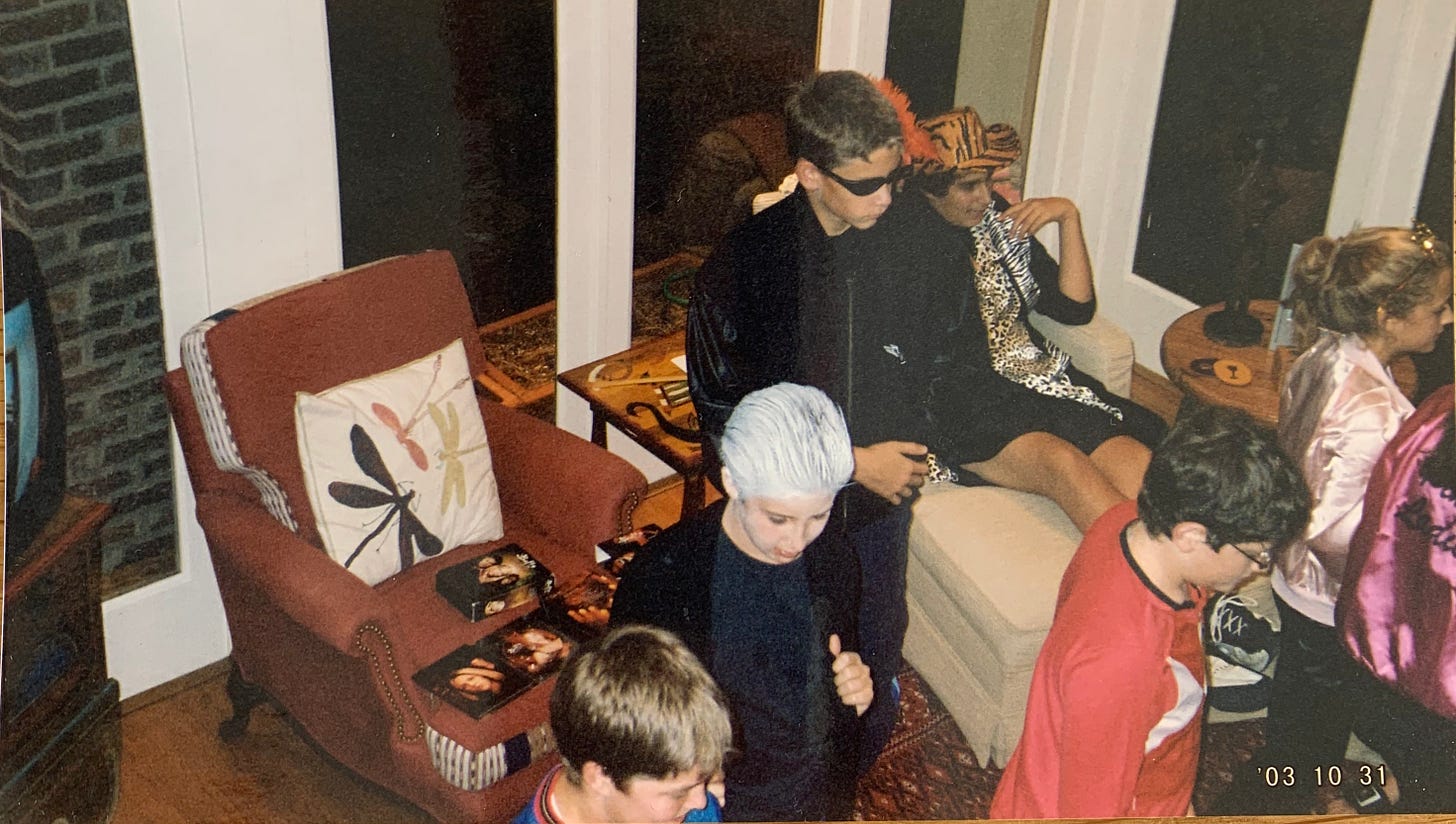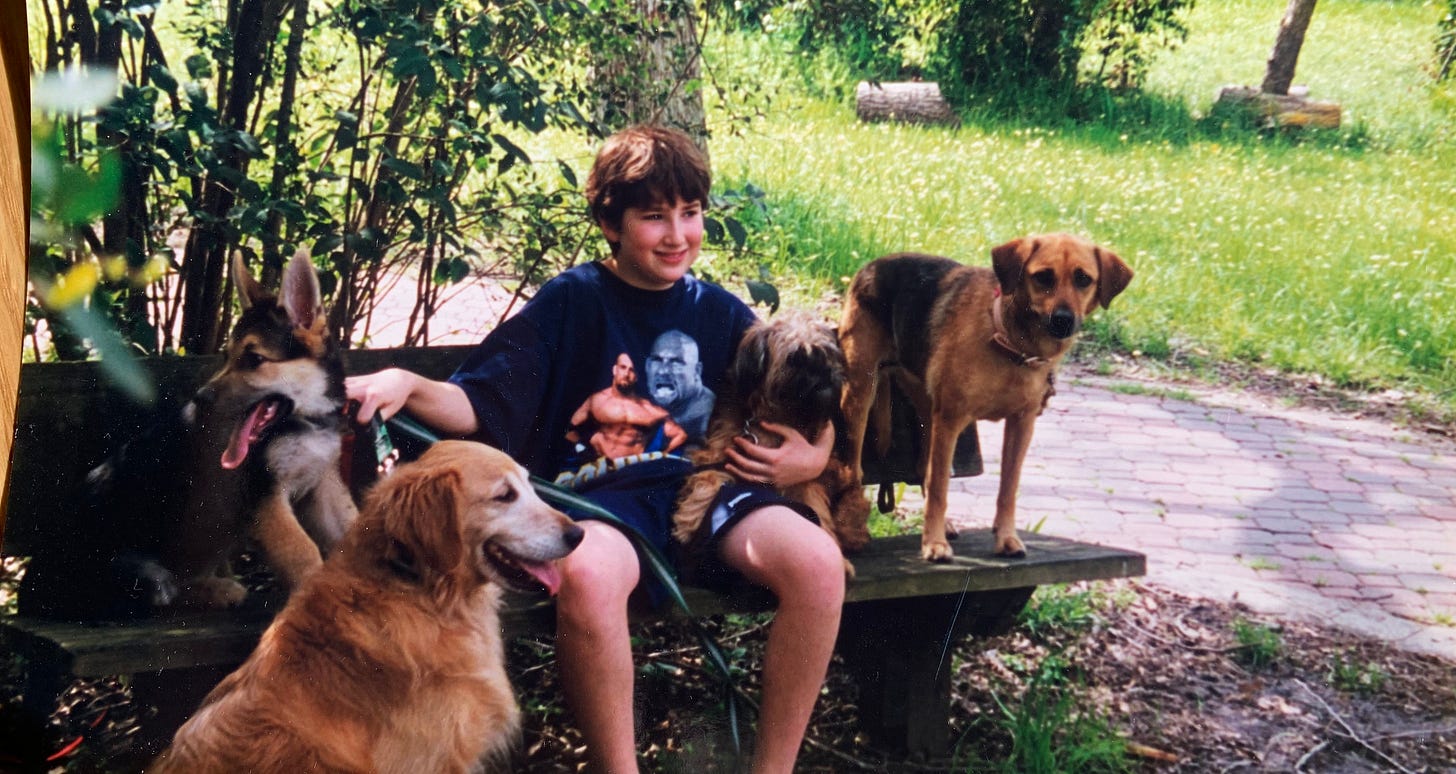It’s been 21 years since we bought that cardboard cut-out of Buffy. The house has since been flooded, the primary players recast. I look back on it all as if it were someone else’s life. And yet, some totems remain. I am known.
This specific incarnation of Sarah Michelle Gellar could only have been from the fifth season of Buffy the Vampire Slayer, my favorite show in the world. This effigy of Buffy would debut at my Bar Mitzvah party, standing next to a cardboard Legolas and Gimli.
My Bar Mitzvah came near the end of the school year, along with the final episodes of Buffy. It had been a hard season, on and off television.
The show had recently betrayed me. The week before my Bar Mitzvah, an episode titled “Dirty Girls” aired, featuring the mutilation of a main character. The show had been scary before, but this eyeball-related maiming crossed into the perverse. I couldn’t close my eyes, couldn’t sleep without seeing it over and over again. I became too frightened to watch Buffy.
It felt like I’d been kicked out of Sunnydale, my purest sanctuary, my escape from seventh grade. I’d long dissociated and ducked out to dream worlds, but this was different. Buffy and Angel were mine, a world of my own discovery. This was pure to me. And now it had taken on the vulgarity of reality.

I was fat, weird, and praying that puberty wouldn’t corrupt me. The sweet Jewish boys I’d grown up with had been seduced by post-9/11 bravado: they now stunk up the locker room with Axe body spray and performed the exotic masculinity of Eminem and 50 Cent. On the eve of my Bar Mitzvah, my older brother handed me a stack of Playboys. I politely refused. None of us were who the other wanted us to be.
My stepfather had died the summer before. My mother, grief-scorched and overworked, would indulge me, cooking us dinner and sitting down so I could show her Buffy. But she was exhausted and dazed, and usually passed out midway through an episode. I was fed up caretaking for the grieving, and didn’t want to talk about how his death affected her, or me. I could only communicate through this show, and needed them to watch it, so that they may see me through it.
And they did take it seriously. For my birthday, my mom got me a membership to the Buffy fan club. It entitled me to receive a quarterly issue of the official Buffy the Vampire Slayer magazine, and an autographed picture of Michelle Trachtenberg. It had been my stepmother who’d shown me my very first episode of Buffy, my dad who’d bought me the first season on DVD. They knew this mattered to me.

If you go to a Jewish school, Bar Mitzvah year is a greasy carnival, an endless durge of Baha Men and Sir Mix-a-Lot, a pubescent reenactment of They Shoot Horses, Don’t They? Every weekend, another classmate—or two, or three or four—has their Torah service, and the requisite party, and you are expected to attend every one, for the sake of not hurting someone’s feelings. It’s mortifying in every way you can imagine: gaudy assimilated Jews shelling out shekels on ice sculptures, so they can outdo one another; the smell of sizzled hair following every J.A.P. with a CHI iron and a disdain for her ethnic sexuality; metal-mouthed boys, the size of munchkins, wearing Air Force Ones and screaming Nelly lyrics. At least the themes were tea: “Diamonds Are a Girls Best Friend,” “Candy,” and, of course, my own “David Goes to Hollywood.”
I was in a phase in which I only wore Hawaiian shirts to parties. Who knows. I was angry and sensitive: when my feelings were hurt my cheeks would burn red and my eyes would well up. I didn’t have the language for my rage, or shame, or the desire to disappear. Mostly I just wanted to play in my room, but in the light of constant exposure, I flailed for attention. I wasn’t well.
I’d seen my parents speak to each other only a handful of times, which made the planning of my simcha a minefield. It was decided that my mom would handle the Friday and Saturday services; my dad and stepmom, the Sunday afternoon party, for all my classmates and a few honored teachers—Ms. Cassack, Ms. Latham and Mr. D., the ones who’d seen in me an original, and took the time to encourage my expression.
On Saturday night, my mother was to throw her own party, for the family and for out-of-town guests: the mishpucha. My dad was not invited, so he decided to throw a party for his out-of-town guests. It was explained to me that I was now an adult in the eyes of God, and, therefore, could decide which parent I wanted to celebrate with. It was Christine torn between the Phantom and Raoul all over again, Meryl Streep with a Polish accent and a choice to make.
That happened a lot, that sort of imposition of impossible responsibility, and in much worse ways. Still, I had two whole families who wanted to celebrate me, who would even buy me a cut-out of my prized Slayer.
I know I wasn’t easy, either. Willful insouciance. Daydreams of Sunnydale, ideations of suicide. I terrorized my Hebrew teacher, was too spoiled to wash a dish. When my dad visited me at school, I mostly ignored him. I was bullied and could bully plenty more. Am I the sum total of all my acting out, or was it just a series of performances, and me the conduit, the consumer? Do I accept it all as me?
The Bar Mitzvah was meant to mark my initiation into adulthood, but it mostly had the opposite effect. The party was a blast: my parents let me be a kid at the arcade with my little friends. But I wasn’t ready to cross over into adulthood. When I was given a cell phone for my 13th birthday, I burst into tears. I had wanted a Transformer.
It was time to return to Sunnydale. I watched the Buffy series finale with bated breath. At every commercial break I’d race to the ringing landline, to recap with my friend Michael Schwartz. An era was ending, and we were experiencing it live.
There’s so much of that time that I won’t write about, and so much I’ve disavowed, because disavowal confers distance. I could write that my mother’s house would be devastated in a flood, that by the time I’d return for my high school reunion, my childhood home no longer existed, and neither did the person who’d grown up there. The deluge had smashed away the bonds of the past. Buried history had been dredged up. It was all a lie. That was never me. You never knew me!
To quote my stepmom’s iconic throw pillow: Blah, blah, blah. Here I am, at 34, writing about Buffy, just like I did at 21 and 29 and 32, still dancing with dissociation, tearing myself out of fictional realities. Over the years, Buffy and Angel have been invoked in therapy and my solo show: they’ve directly helped me face and forgive the past.
The show was meant to be an escape hatch from the hell of that time, from my family, but it always leads me back to them. My mother preserved the Buffy statue, she passed the Beanie Babies and Pokemon cards as hallowed heirlooms to my nieces and nephews. The family doesn’t cringe at fat photos of me, or look away from the failures. They wish to keep watching, and rewatching, in this world or in the fantasy of my choosing. They wish to see me.





